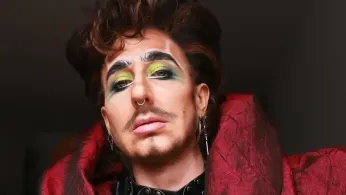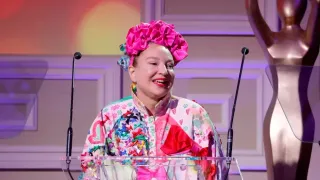
Oct 28
Canada’s 'Drag Race' Makes Herstory: Velma / Johnny Jones Cast as First Drag King in Global 'Drag Race' Franchise
READ TIME: 4 MIN.
Canada’s Drag Race season six has ignited international attention with the announcement that Velma / Johnny Jones, a 39-year-old performer from Montreal, will participate as both a drag queen and, occasionally, in her drag king persona Johnny Jones. This marks the first time in the 16-year history of the Drag Race franchise that a drag king has been cast on any version of the show, setting a precedent for the inclusion of artists who have long been underrepresented in televised drag competitions. The season is set to premiere on Crave in Canada and WOW Presents Plus internationally on November 20, 2025, and will air weekly across nine episodes .
Velma Jones, whose off-stage name is Ariane Laguë-Barrette, is an AFAB artist—meaning assigned female at birth—who performs under two personas: Velma Jones as a drag queen and Johnny Jones as a drag king. In the official “Meet the Queens” video, Velma introduced herself by stating, “Are you ready to make herstory with me? Because I’m your first drag queen being a cis woman. And also, you’re getting the special two-for-one because you got Velma, and sometimes, here’s Johnny. I can’t wait to show you my drag king persona Johnny also. I’m here to prove that I can do anything like the others” .
Velma Jones’s participation is seen as a significant expansion of the kinds of drag represented on the show. While the Drag Race franchise has previously welcomed cisgender women, non-binary performers, and trans artists, Velma is the first to bring a drag king persona to the main competition, a long-standing hope among fans and former contestants alike .
The news has sparked a wave of celebration and discussion across social media and LGBTQ+ media outlets. Notably, previous Drag Race stars such as Bimini, Ginger Johnson, and Victoria Scone—herself the first cisgender woman to compete on Drag Race UK—have publicly advocated for the inclusion of drag kings, underscoring the importance of broadening drag’s mainstream image beyond its traditional roots .
Velma Jones is no stranger to the drag scene, having won competitions like Drag Moi at Cabaret Mado and Mx Cocktail at Le Bar Cocktail, and performing at major events such as Montreal Pride’s Drag Superstar show in 2023. She is also recognized for her mentorship and support of younger drag artists, co-directing and producing shows alongside past Drag Race winner Gisele Lullaby .
The decision to cast Velma Jones is especially significant given the ongoing conversations within the drag community about the visibility and recognition of drag kings. While drag queens have historically dominated popular culture and television, drag kings have often been marginalized or overlooked. The inclusion of Johnny Jones on Canada’s Drag Race signals a move toward a more inclusive and accurate representation of the diversity within drag performance .
Since RuPaul’s Drag Race first premiered in 2009, the show has become a global phenomenon, spawning dozens of international editions and special seasons. The vast majority of contestants have been drag queens, with incremental steps toward greater inclusion of trans and AFAB artists in recent years. Victoria Scone’s casting in Drag Race UK season three marked the first time a cisgender woman competed, paving the way for further diversification .
Outside the Drag Race universe, 2025 also saw the premiere of King of Drag, the first-ever reality competition series dedicated exclusively to drag kings, on the streaming service Revry. This show’s debut, along with Velma Jones’s casting, is seen by many as a long-overdue recognition of the artistry, creativity, and talent that drag kings bring to the drag world .
Velma Jones is joined by eleven other contestants from across Canada, representing a range of backgrounds, drag styles, and communities. The season six cast includes Van Goth (Toronto), Sami Landri (Moncton), Star Doll (Toronto), Saltina Shaker (Ottawa), PM (Vancouver), Paolo Perfección (Montreal), Mya Foxx (Halifax), Karamilk (Toronto), Hazel (Vancouver), Eboni La’Belle (St. Catherines), and Dulce (London) . Standout cast members such as Saltina Shaker, with nearly 2.5 million TikTok followers, and Mya Foxx, the first Nova Scotian on the show and representative of Inuit heritage, further underscore the diversity and richness of Canada’s drag community .
The inclusion of a drag king in the Drag Race franchise is not merely symbolic; it has real implications for visibility, acceptance, and opportunity. Drag kings, who typically perform masculinity and often challenge traditional gender norms, have historically faced greater barriers to recognition within both LGBTQ+ spaces and mainstream culture. By showcasing a drag king on one of reality television’s most influential platforms, Canada’s Drag Race is providing a crucial opportunity for audiences to engage with the full spectrum of drag performance .
LGBTQ+ advocates and culture commentators have praised the move, with many hoping that this signals a shift toward even greater diversity in future seasons—not only in Canada but across the global Drag Race franchise. The response from fans and media has been overwhelmingly positive, with the announcement trending on social media platforms and generating thoughtful discussions about the evolution of drag and the importance of inclusive representation .
Velma Jones’s participation in Canada’s Drag Race season six is a watershed moment for both the Drag Race franchise and the broader drag community. It highlights the necessity of recognizing and celebrating the diverse expressions of gender, artistry, and identity that define drag. As the season prepares to air, all eyes will be on Velma—and Johnny Jones—to see not only how they compete, but how their presence shapes the future of drag representation on television and beyond.






